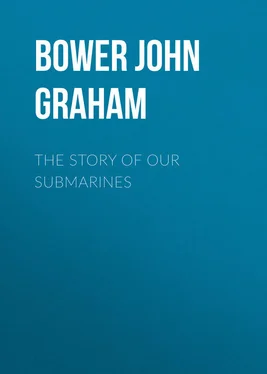John Bower - The Story of Our Submarines
Здесь есть возможность читать онлайн «John Bower - The Story of Our Submarines» — ознакомительный отрывок электронной книги совершенно бесплатно, а после прочтения отрывка купить полную версию. В некоторых случаях можно слушать аудио, скачать через торрент в формате fb2 и присутствует краткое содержание. Жанр: foreign_antique, foreign_prose, foreign_language, на английском языке. Описание произведения, (предисловие) а так же отзывы посетителей доступны на портале библиотеки ЛибКат.
- Название:The Story of Our Submarines
- Автор:
- Жанр:
- Год:неизвестен
- ISBN:нет данных
- Рейтинг книги:4 / 5. Голосов: 1
-
Избранное:Добавить в избранное
- Отзывы:
-
Ваша оценка:
- 80
- 1
- 2
- 3
- 4
- 5
The Story of Our Submarines: краткое содержание, описание и аннотация
Предлагаем к чтению аннотацию, описание, краткое содержание или предисловие (зависит от того, что написал сам автор книги «The Story of Our Submarines»). Если вы не нашли необходимую информацию о книге — напишите в комментариях, мы постараемся отыскать её.
The Story of Our Submarines — читать онлайн ознакомительный отрывок
Ниже представлен текст книги, разбитый по страницам. Система сохранения места последней прочитанной страницы, позволяет с удобством читать онлайн бесплатно книгу «The Story of Our Submarines», без необходимости каждый раз заново искать на чём Вы остановились. Поставьте закладку, и сможете в любой момент перейти на страницу, на которой закончили чтение.
Интервал:
Закладка:
"At 8 A.M. I heard the sound of shots falling on the water and decided to slip, which I did. Turned to starboard to get clear of trawler and came to 18 feet for a look. Closed enemy to 500 yards, and fired port tube at 8.12. As I fired I observed enemy start her engines, and torpedo missed astern. I shifted my deflection and fired the starboard tube. Torpedo hit the submarine just abaft the conning-tower. I blew main ballast tanks and picked up seven survivors (Captain, two officers, and four men). The weather being too bad to get in tow again, I returned to harbour."
Lieutenant Cantlie, in the trawler, reports: —
"7.55 A.M., July 20: Sighted hostile submarine three points on port bow, distant 2500 yards – informed 'C 27,' and told her not to slip yet. Hostile submarine steering across my bows. 7.56: Enemy opened fire, apparently trying to hit trawler. Telephone to 'C 27' broke down. 8.03 A.M.: Tow slipped. Enemy fired about seven shots altogether. Employed trawler's crew in hoisting out boat, rushing about the deck, and appearing to be in a panic. 8.10 A.M.: Observed 'C 27's' periscope on starboard quarter attacking enemy. 8.12 A.M.: Observed 'C 27' fire a torpedo, which missed astern. Cleared away starboard gun for action. Enemy opened fire again on trawler, and commenced turning to port. I opened fire with my starboard gun, hoisting white ensign at the main. At the same moment second torpedo hit just abaft enemy's conning-tower. Column of water and smoke rose about 80 feet high. As it cleared away 30 feet of bow of submarine at a large angle could be seen…"
The success of this scheme of U-boat hunting depended, of course, entirely on the secrecy maintained as to its existence; it was therefore unfortunate that the prisoners from U 23 were allowed to mix with interned German civilians who were about to be repatriated – a mistake which was excusable in the midst of the general confusion caused in the authorities' minds by the change from peace to war. At that date the disposal of prisoners was out of the Admiralty's hands, and on this mistake being discovered, steps were taken that prisoners having secrets to tell should be prevented from telling them to Germany. The trawler scheme of hunting, however, had to be given up for some time.
In 1916 U-boats again became active against the fishing fleets on the Dogger, and C boats were again sent out to work with the trawlers. On August 28, "C 29" (Lieut. Schofield), while being towed submerged, struck a mine off the Humber and was lost with all hands. The method was continued for a few more trips, but the U-boats being by then too careful, it was abandoned before the end of the year.
There were eighteen German boats in all sunk by torpedoes from our submarines, while others were hit but were able to get home. I will try to imagine a typical case of submarine v. submarine, in order to give an idea of what lies behind the bare despatches of the victors.
III
The E boat was working a "beat" ten miles to the north of the North Dogger Bank Lightship – a dull beat, too, as in 1918 the U-boat captains had long ago given up the idea of passing near lightships in surface trim. The patrol was not there for enemy submarine strafing, however. The E boat was a unit of the watching semicircle that dived eternally, from the Haaks light off the Dutch coast to Hiorn's Reef off Jutland, watching for a cloud of smoke to the east that would tell of the coming of the High Sea Fleet. The boat had been on the billet two days, and had five more to wait before she started her run home to Harwich. She had spent the short spring night jogging about on the surface at six knots, charging her batteries, and at 4 A.M. she slowed up and slipped under. It was her thirtieth patrol trip, and she expected it to be as dull as most of the others had been; there was a kind of yawning, done-it-all-before air in the way the crew took her under that morning, that showed, besides good training, a familiarity with intricate mechanism that had developed into something approaching contempt. The boat settled to her day's dive at twenty feet, her periscope moving slowly along at a speed of about two knots, leaving a very faint rippling line on the smooth North Sea surface. The Captain swung the periscope round, wiped the eyepiece with a nominally clean chamois-leather pad, and then leaned back against the diving gauge, finishing the fag-end of a cigarette. It was still twilight in the world above him, and the bad light, combined with the fact that periscopes are very apt to "fog" for some minutes after diving, when the engines are still hot enough to make the air in the boat steamy, would prevent him seeing anything clearly for twenty minutes. It was a rule of his to keep the early morning periscope watch himself, as he believed that if anything exciting was going to happen it would always occur at dawn. Certainly, as far as U-boats go, his ideas were right, as a boat on passage is humanly liable to hold on to her surface speed and trim as long as there is a hint of darkness left to protect her, and in submarine war it is the one that gets under earliest that lives longest.
The Captain took another look through the periscope, and saw the familiar level floor of the sea blending with the pink and grey of the dawn just as he had seen it on so many previous mornings. He looked forward along his boat and saw the sleeping forms of sailors all the way along the battery deck cloths till his eye was attracted by a pair of sea-boots that projected through the gap in the wardroom curtain. Those were his First Lieutenant's boots, and his First Lieutenant, he knew well, was snoring loudly beyond them. He threw his cigarette end impatiently down the periscope well and began slowly moving the heavy periscope round, shuffling around with it as he swept the clearing horizon. It seemed a silly thing to be keeping the morning watch, of all watches, when he had two young and lazy officers to work for him. Their eyes were younger than his, and his were more valuable to the country anyway. It seemed absurd that only he and four "diving hands" should be awake, while all the rest snored. Why should he, an experienced and skilled officer, be at work at half-past four on a dull morning? Why, when he was a junior Lieutenant … he straightened up from the eyepiece…
"Call the First Lieutenant!"
An hour later the situation in the E boat was the same, except for the fact that a gloomy officer in a soiled sweater and a pair of still more soiled grey flannel trousers plodded round the periscope pedestal, while a pair of stockinged feet showing through the curtain showed whither the Captain's train of thought had led him. The crew still dozed fore and aft the boat. At regular intervals the hydroplane motors buzzed noisily as a turn of the wheels corrected her depth; from right aft came the monotonous ticking of a main motor that slowly turned the port propeller and urged the boat lazily along. In the wardroom the Captain, supremely oblivious to a monotonous drip of leaking water from a seam directly over his outthrown left hand, was back in the days before the war, when the Berkeley Hounds had had three forty-five minute bursts in a day, and he had ridden all three on the same horse. In his dreams he seemed to hear the drumming of many horses' hoofs on the sloping pastures, and the clash and tinkle of stirrups touching as the crowded field fought for room at the first fence. Then he woke and lay propped on one elbow, with a leg thrown over the side of his bunk, while his heart missed two complete beats. He had not heard the order of "action stations," that came from the periscope position, but he knew well the only possible order that could send men rushing past him to man the bow tubes. He pulled his sea-boots on as he sat up, then jumped down and covered the distance aft to the periscope in half a dozen swift strides. The First Lieutenant, his face alight with suppressed emotions, stepped clear and spoke: "Fritz – bow-on, I think – big one" – then dashed forward to superintend the men at the bow tubes. All along the boat a clatter and ring of metal on metal told of preparation for firing. Amidships a hiss and splutter of air showed that the beam tubes were flooding, till a spurt of water coincided with a sharp cry of "Tubes full, sir!" The Captain spoke into the voice-pipe at his side, and the ticking sound from the main motors rose to a steady hum. He lowered the periscope till the eyepiece was level with the deck, and stood drumming his fingers against the hoisting wires. The matter of seeing the tubes cleared away and of keeping the boat's trim right lay now with his officers. His head was to be concerned only with the attack and the shot. He alone would be to blame for a miss now, and he had too well-trained a staff for him to need to worry over any diving details during an attack. His brain was working outside the boat in the early sunshine, where a big and confident U-boat was bound out for her station in the Irish Sea. The enemy was heading straight at him, and he himself was crossing her bow from port to starboard, heading north. To get his bow tubes to bear meant a quick rush to the north to get to a fair range, and then a turn to port till his head was south and the enemy ran across his sights. He was, in view of the glassy state of the sea, keeping his periscope out of sight as long as possible, and intended to keep the instrument lowered till, on his estimate of the U-boat's course and speed (gauged in his first rapid glance) and his submarine sixth sense, he had turned inwards from a point on his target's starboard bow. In sixty-five seconds from the first sighting of the enemy, peace and quiet reigned again in the E boat. Except for the occasional slight hiss and gurgle as a tube-vent was tested, there was no sign to tell that the whole boat was on a tiptoe of expectant emotion. Three minutes from his first order to increase speed he starboarded his helm and – still with his periscope lowered – began his turn through west to south. His hands fidgeted now on the taut hoisting wires before him, and every nerve in his body cried for a glance at the enemy just to check his mental estimate. His first glance when his turn was half through would show him whether he had judged rightly, or whether he had made a miscalculation which would be heavy on his soul till the end of his days. But his nerves were well in hand and his will strong; the repeater of the gyroscopic compass had ticked slowly round under his gaze until it showed 275° – a trifle north of west. Then the periscope rose with a sigh and a creak of straining wires. He stooped and pressed his eye to the instrument as it rose, waiting for the very earliest glimpse of the upper world. All along the boat the men leaned from their stations to watch, for they knew exactly what depended on the quick decision based on that first glimpse he had taken. To his eye the green flickering circle lightened, paled, and then changed to a clear pale-blue sky and a sparkling stretch of sea. He had hoisted the periscope trained to south-west by south, and his heart gave a jump in gratitude to the training that had given him brains to judge rightly. The U-boat – very near and big – with a little foaming line falling away from her bows, was sailing slowly across the periscope, and he winced as he saw on her bridge the little group of figures that seemed to be looking straight at his face. Instantly he lowered the periscope and forced himself – for he felt that he ought to whisper, in fear of his enemy hearing – to shout the order to "stand by bow tubes." A few seconds later he spoke again as the periscope rose – "Midships – steady on one-eight-five – stop starboard."
Читать дальшеИнтервал:
Закладка:
Похожие книги на «The Story of Our Submarines»
Представляем Вашему вниманию похожие книги на «The Story of Our Submarines» списком для выбора. Мы отобрали схожую по названию и смыслу литературу в надежде предоставить читателям больше вариантов отыскать новые, интересные, ещё непрочитанные произведения.
Обсуждение, отзывы о книге «The Story of Our Submarines» и просто собственные мнения читателей. Оставьте ваши комментарии, напишите, что Вы думаете о произведении, его смысле или главных героях. Укажите что конкретно понравилось, а что нет, и почему Вы так считаете.












